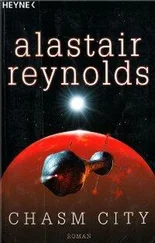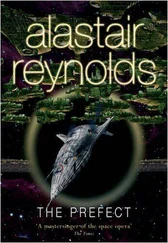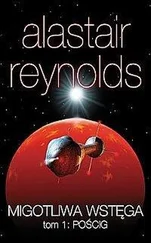Though the mood swings came without warning, they were always accompanied by a perceptible shift of focus in Clavain’s eyes, as if what was taking place around him had suddenly ceased to be of significant interest.
The first few times that this happened, Vasko had naturally assumed that he had done something to displease the old man. But it quickly became apparent that Scorpio was getting the same treatment, and that Clavain’s distant phases had less to do with anger than with the loss of a signal, like a radio losing its frequency lock. He was drifting, then snapping back to the present. Once that realisation had dawned, Vasko stopped worrying so much about what he said and did in Clavain’s presence. At the same time he found himself more and more concerned about the state of mind of the man they were bringing home. He wondered what kind of place Clavain was drifting to when he stopped being present. When the man was friendly and focused on the here and now, he was as sane as anyone Vasko had met. But sanity, Vasko decided, was like the pattern of lights he could see through his cabin window. In al-most any direction the only way to travel was into darkness, and there was a lot more darkness than light.
Now he noticed a strange absence of illumination cutting through the lights of one of the larger settlements. He frowned, trying to think of somewhere he knew where there was an unlit thoroughfare, or perhaps a wide canal cutting back into one of the islands.
The shuttle banked, changing his angle of view. The swathe of darkness tilted, swallowing more lights and revealing others. Vasko’s perceptions flipped and he realised that he was seeing an unlit structure interposed between the shuttle and the settlement. The structure’s immensely tall shape was only vaguely implied by the way it eclipsed and revealed the background lights, but once Vasko had identified it he had no trouble filling in the details for himself. It was the sea tower, of course. It rose from the sea several kilometres out from the oldest of the settlements, the place where he had been born.
The sea tower. The ship.
Nostalgia for Infinity.
He had only ever seen it from a distance, for routine sea traffic was forbidden close to the ship. He knew that the leaders sailed out to it, and it was no secret that shuttles occasionally entered or left the ship, tiny as gnats against the gnarled and weathered spire of the visible hull. He supposed Scorpio would know all about that, but the ship was one of the many topics Vasko had decided it would be best not to raise during his first outing with the pig.
From this vantage point, the Nostalgia for Infinity still looked large to Vasko, but no longer quite as distant and geologically huge as it had done for most of his life. He could see that the ship was at least a hundred times taller than the tallest conch structure anywhere in the archipelago, and it still gave him a bracing sense of vertigo. But the ship was much closer to the shore than he had realised, clearly an appendage of the colony rather than a distant looming guardian. If the ship did not exactly look fragile, he now understood that it was a human artefact all the same, as much at the mercy of the ocean as the settlements it overlooked.
The ship had brought them to Ararat, before submerging its lower extremities in a kilometre of sea. There were a handful of shuttles capable of carrying people to and from interplanetary space, but the ship was the only thing that could take them beyond Ararat’s system, into interstellar space.
Vasko had known this since he was small, but until this moment he had never quite grasped how terribly dependent they were on this one means of escape.
As the shuttle fell lower, the lights resolved into windows, street lamps and the open fires of bazaars. There was an un-planned, shanty-town aspect to most of the districts of First Camp. The largest structures were made from conch material that had washed up on the shore or been recovered from the sea by foraging expeditions. The resulting buildings had the curved and chambered look of vast seashells. But it was very rare to find conch material in such sizes, and so most of the structures were made of more traditional materials. There were a handful of inflatable domes, some of which were almost as large as the conch structures, but the plastics used to make and repair the domes had always been in short supply. It was much easier to scavenge metal from the heart of the ship; that was why almost everything else was lashed together from sheet metal and scaffolding, forming a low urban sprawl of sagging rectangular structures seldom reaching more than three storeys high. The domes and conch structures erupted through the metal slums like blisters. Streets were webs of ragged shadow, unlit save for the occasional torch-bearing pedestrian.
The shuttle slid over some intervening regions of darkness and then came to hover above a small outlying formation of structures that Vasko had never seen before. There was a dome and a surrounding accretion of metal structures, but the whole ensemble looked a good deal more formal than any other part of the town. Vasko realised that it was almost certainly one of the administration’s hidden encampments. The body of humans and pigs that ran the colony had offices in the city, but it was also a matter of public knowledge that they had secure meeting places not marked on any civilian map.
Remembering Clavain’s instructions, Vasko made the window seal itself up again and then waited for the touchdown. He barely noticed it when it came, but suddenly his two companions were clambering down the length of the cabin, back to-wards the boarding ramp. Belatedly, Vasko realised that the shuttle had never had a pilot.
They stepped down on to an apron of fused rock. Floodlights had snapped on at the last minute, bathing everything in icy blue. Clavain still wore his coat, but he had also donned a shapeless black hood tugged from the recesses of the collar. The hood’s low, wide cowl threw his face into shadow; he was barely recognisable as the man they had met on the island. During the flight, Scorpio had taken the opportunity to clean him up a little, trimming his beard and hair as neatly as circumstances allowed.
“Son,” Clavain said, “try not to stare at me with quite that degree of messianic fervour, will you?”
“I didn’t mean anything, sir.”
Scorpio patted Vasko on the back. “Act normally. As far as you’re concerned, he’s just some stinking old hermit we found wandering around.”
The compound was full of machines. Of obscure provenance, they squatted around the shuttle or loomed as vague suggestions in the dark interstices between the floodlights. There were wheeled vehicles, one or two hovercraft, a kind of skeletal helicopter. Vasko made out the sleek surfaces of two other aerial craft parked on the edge of the apron. He could not tell if they were the type that could reach orbit, as well as fly in the atmosphere.
“How many operational shuttles?” Clavain asked.
Scorpio answered after a moment’s hesitation, perhaps wondering how much he should say in Vasko’s presence. “Four,” he said.
Clavain walked on for half a dozen paces before saying, “There were five or six when I left. We can’t afford to lose shuttles, Scorp.”
“We’re doing our best with very limited resources. Some of them may fly again, but I can’t promise anything.”
Scorpio was leading them towards the nearest of the low metal structures around the dome’s perimeter. As they walked away from the shuttle, many of the shadowy machines began to trundle towards it, extending manipulators or dragging umbilical cables across the ground. The way they moved made Vasko imagine injured sea monsters hauling ruined tentacles across dry land.
Читать дальше












